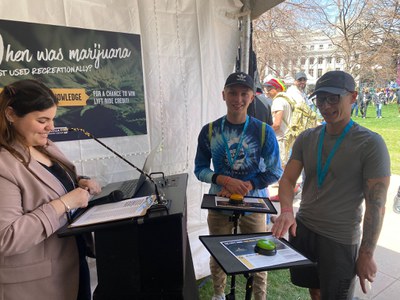CDOT and AAA Colorado quiz cannabis consumers about impaired driving
News Release

Read this news release in Spanish.
Statewide — Today, the Colorado Department of Transportation challenged Mile High 420 Festival attendees at Civic Center Park in downtown Denver to a Cannabis Quiz about impaired driving. The largest gathering of cannabis consumers in Colorado, CDOT and AAA Colorado educated consumers about the dangers of impaired driving and encouraged the use of rideshare and other alternatives to driving high.
In 2021, 691 lives were lost on Colorado roads, up 50% since 2011. Since 2019, there has been a 44% increase in fatalities involving impaired drivers. While alcohol remains the most common impairing substance, marijuana impairment and marijuana in combination with alcohol impairment are significant contributors to the problem. For example, an analysis of DUI case filings in 2019, 68% of individuals with detected Delta-9 THC also had another substance present. Alcohol was the most common co-occurring substance.
“It is a notable day for marijuana consumers in Colorado, and we want to prevent anyone from getting behind the wheel if they’ve been consuming cannabis, alcohol or other drugs,” said CDOT’s Office of Transportation Safety Director Darrell Lingk. “Driving high is dangerous and illegal, and any amount of impairment puts you at risk for a DUI.”
An event booth hosted a traffic safety Cannabis Quiz to convince attendees to make smart choices with an opportunity to win rideshare credits.
"Coloradans have always been thoughtful when it comes to cannabis," said Skyler McKinley, regional director of public affairs for AAA. "Let's continue to set an example for the rest of the country. No matter what you choose to use, there's just never any reason to drive impaired."
CDOT partnered with the Marijuana Industry Group, Colorado’s largest cannabis trade organization, to provide the Lyft ride credits to quiz participants.
“The cannabis industry prioritizes health and safety, and we want to ensure safe drivers in our communities,” said Truman Bradley, the Executive Director for the Marijuana Industry Group. “MIG members are excited to provide a tangible alternative to impaired driving and help spread the message. It's simple: don't drive high.”
CDOT has a successful history partnering with the cannabis industry to educate consumers. The 2022 festival marks the third year that CDOT has worked with festival organizer Euflora, and CDOT’s research shows industry influencers like Euflora can effectively encourage responsible behavior. Returning after two years due to COVID-19 restrictions, the Mile High 420 Festival welcomed thousands of attendees.
CDOT’s attendance at the festival is part of a broader program to prevent cannabis-impaired driving. The “Uncomfortable High” campaign can be seen online, on connected TV devices, in print, at dispensaries and heard on the streaming audio during April and May. CDOT also provides resources to statewide dispensaries to educate budtenders about the laws and consequences of impaired driving to share with their customers.
How much do you know about cannabis and impaired driving? Take a portion of our safe driving quiz to find out.
When was Marijuana legalized in Colorado?
- November of 2012
- January of 2016
- February of 2011
- March of 2012
Research shows cannabis use impairs:
- Peripheral vision
- Reaction time
- The ability to execute divided attention tasks
- Perception of distance and speed
- All of the above
What is the potential long-term financial cost of a DUI?
- $13,500
- $400
- $2,000
- $10,450

To learn more about cannabis-impaired driving in Colorado, visit the CDOT Drugged Driving homepage, and find the latest data and educational resources. CDOT aims to change the norms around driving high, reducing the number of cannabis-impaired crashes and deaths on Colorado roads through research-based awareness and education.
